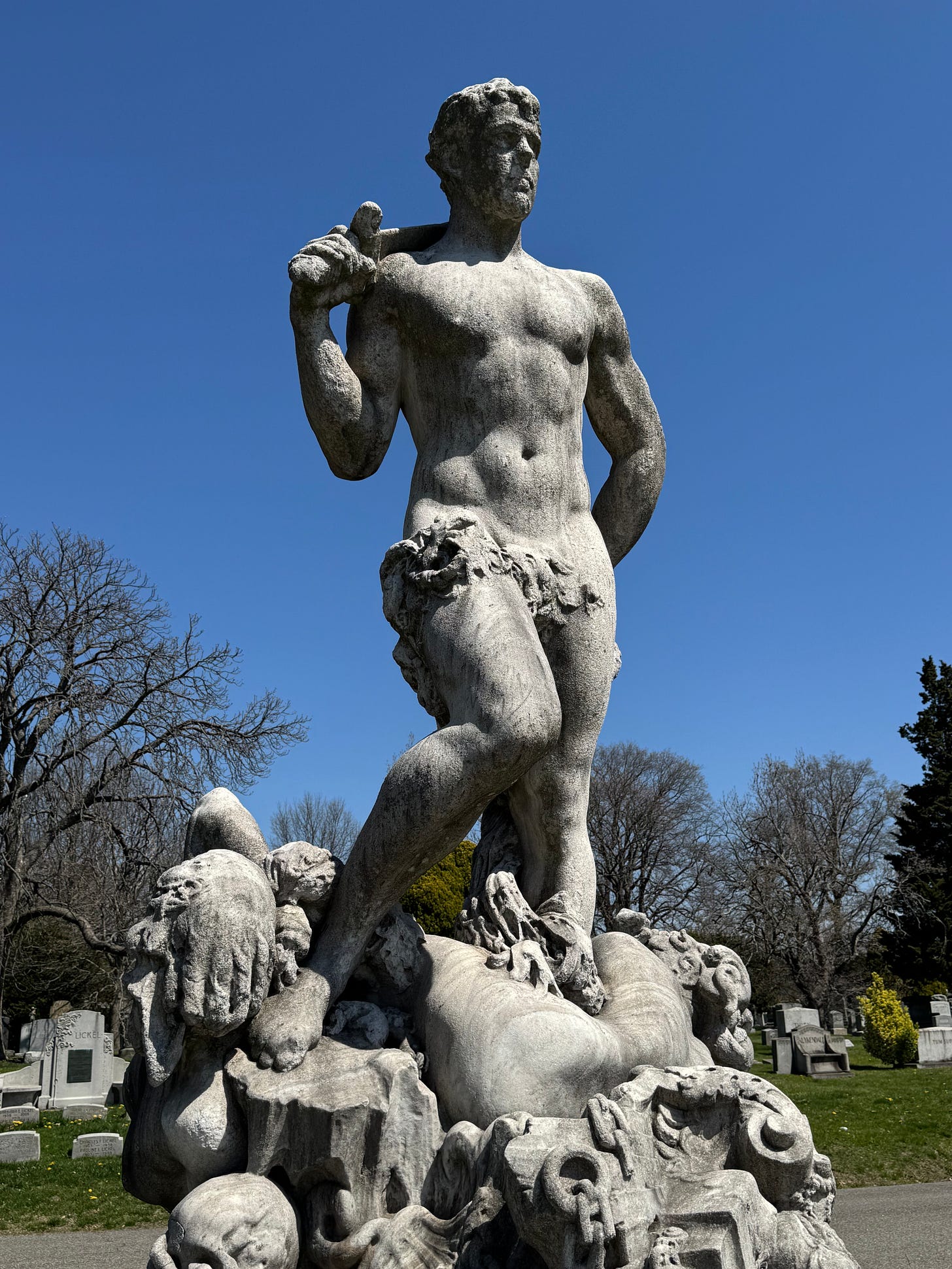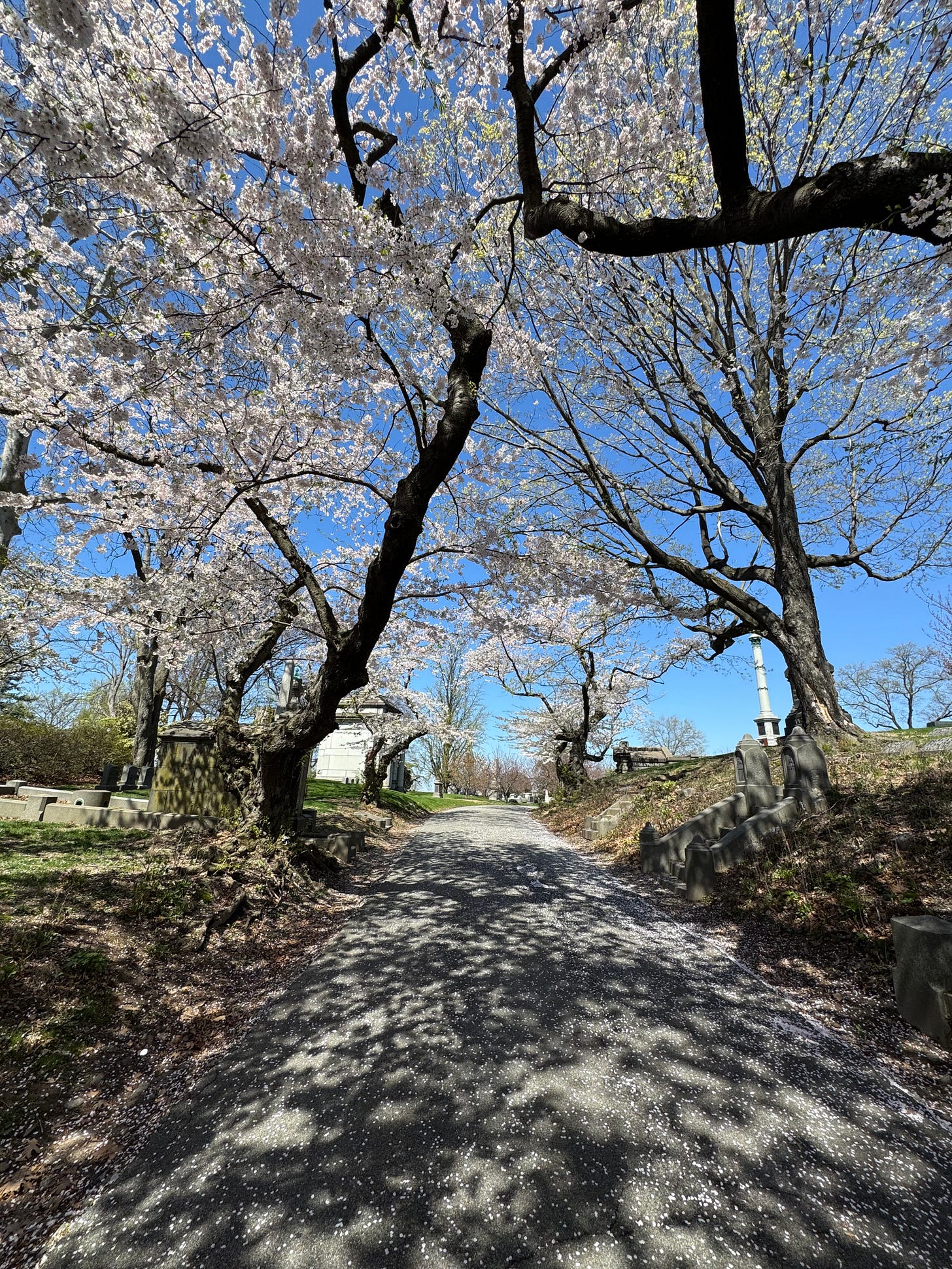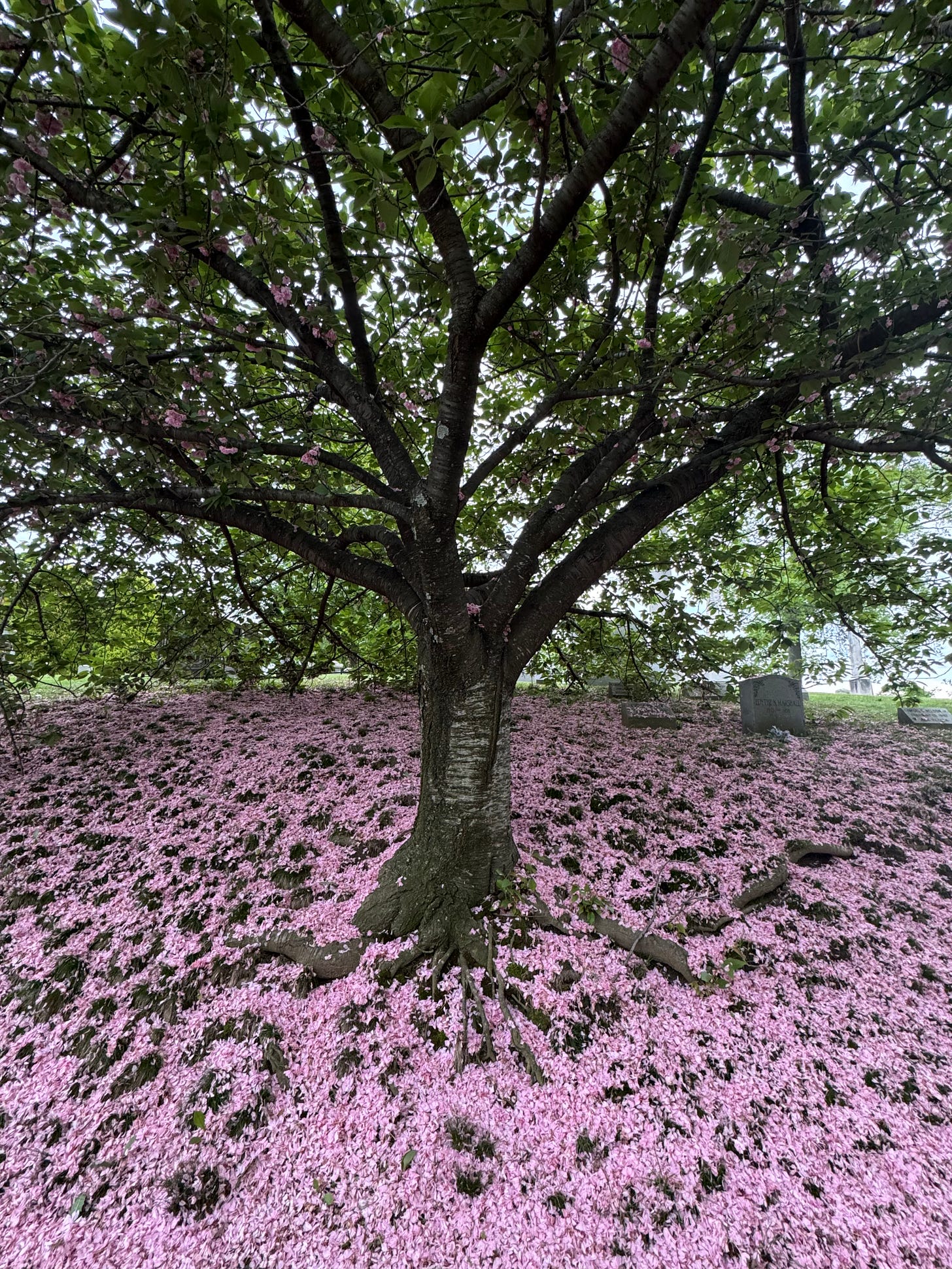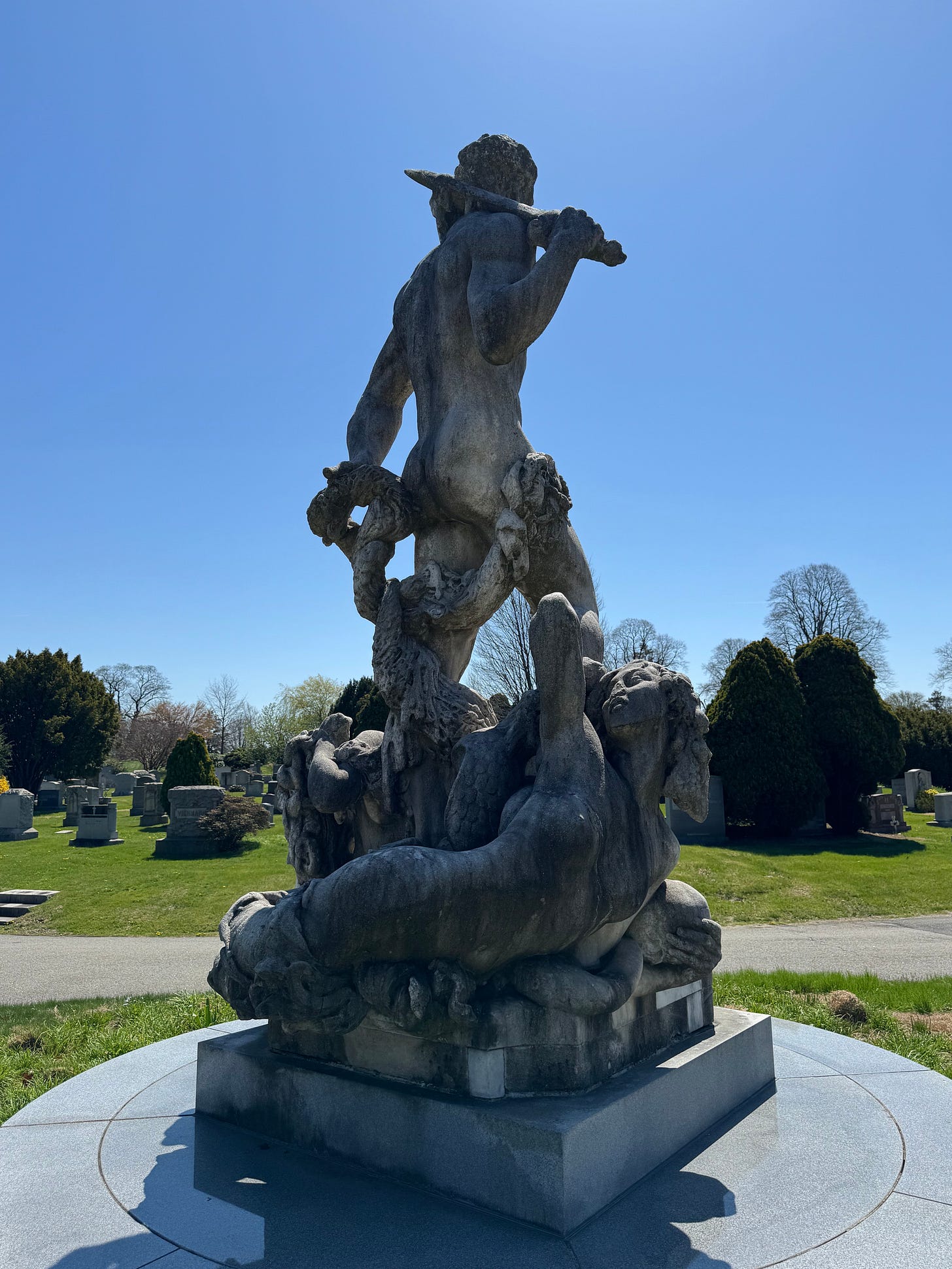Beautiful Mess
On Blooming, Shedding, Being
Prefer to listen? Here’s the audio version of this piece, in my own voice.
For the past three months, one of my favorite haunts in Brooklyn has been the Green-Wood Cemetery. I’ve seen it in two seasons now—late winter and early spring.
Winter without snow is eerie. The trees claw at the sky, their branches stripped bare like gnarled fingers. The grass lies dull and patchy, a muted green stretched over hardened soil. The gravestones stand gray and stoic, engraved with names of those who came before. Then there are the mausoleums, ornate and silent, giving the place the feel of a forgotten city.
I walk by one statue regularly. It’s hard to miss: over twenty feet tall, a massive naked man towering over two serpent-tailed women. It’s called Civic Virtue. He stands sword in hand, trampling the feminine figures of Vice and Corruption, sirens caught in their own nets. The sculpture, designed by Frederick MacMonnies and carved by the Piccirilli Brothers, was originally placed in City Hall Park in 1922. Unsurprisingly, it caused a stir. The Nineteenth Amendment had just passed. Women were voting, organizing, and speaking out. And here was a man, bare-assed and self-righteous, literally stomping on two of them.
The designer called it allegory. In his words:
“Can it be, that the women are angry because some man finally found the strength to resist temptation? In most instances of romantic sculpture, we have the man succumbing to the temptress. I think women should be pleased when strength is found to withstand their wonderful wiles. Antiquity is all the other way.”
What a rebuttal—vilify the feminine to elevate the masculine. A tale as old as patriarchy.
It reminds me of Eve, blamed for the fall of mankind. Of Pandora, scorned for unleashing all the evils of the world. But in both stories, it’s easy to forget who set the trap. God planted the tree, Zeus gifted the jar. The true tempters weren’t women, but the men—or gods—who created the conditions for failure.
Yet men managed to mythologize their faults, casting them in female form and calling it divine order. An incredible PR spin.
Every time I pass the Civic Virtue statue, I think of the myths we’re fed—Eve, Pandora, the eternal blaming of women for humanity’s fall. (Also, those marble glutes? A firm reminder to do some more squats.) I recently finished writing a novelette retelling Pandora’s myth. It’s one that peels back the layers of her creation, the Olympian deceit behind it, and explores where the blame truly belongs.
Just beyond the statue, a row of cherry blossoms bloomed. I watched them week by week—first white and delicate, then blushing pink until the trees looked like cotton candy. There’s something sacred about witnessing such gentle beauty in a place made for the dead. Like their passions are resurging through soil, roots, and limbs. A reminder of life among the stillness.
They’re in full bloom for about a week. Then comes the shedding—those gorgeous petals falling like soft pink snow.
Soon, the ground is blanketed. The branches are left with sturdy green leaves, the trees’ intentions now shifted. It’s like a quiet expression of victory.
As I stood there, observing the beautiful mess, I found myself thinking not just about the season, but about the phases of life we grow through—and out of.
We shed things all the time, whether we realize it or not. Old habits. Beliefs. Places. Friendships. Lovers. Jobs. Professional connections. Things that may have felt right at one point in time but no longer serve us.
Sometimes we outgrow them like a snake outgrows its skin. Sometimes people who once showed us beauty reveal their ugliness…or rattle us when they expose our own. We turn away, as men did from Medusa—another woman who deserves a better telling. Staring too long can harm us. Perhaps beyond repair.
Some endings are sudden, like a band-aid torn from skin. Others fade slowly, a quiet decrescendo we barely register until we look up and realize something’s gone.
I thought about the years I spent living and working abroad. Traveling through disaster sites and places that were either enmeshed in or recovering from conflict. Building things I believed in. I returned to the U.S. to find that the work I loved had been gutted by inept leadership and short-sighted policies. I had no choice but to shed that version of myself—to reinvent. I’m stronger, more resilient—like the trees—but not untouched. Reinvention rarely comes without scars.
And yet—I had the option to come home. To start again.
Not everyone does.
I think daily of Palestinians in Gaza—entire families whose lives have been torn apart by Israeli bombs, starvation, displacement, and state-sanctioned violence. The U.S., my country, actively continues to fund this atrocity. It’s gaslighting of a global scale. One sociopathic leader backing another and for what? The so-called institutions meant to prevent such horrors are neglected, even targeted as the death count of aid workers rises. Human rights watchdogs continue to issue their statements of condemnation—the very warnings they were created to deliver. All the while, children are maimed, tortured, slaughtered.
It’s hard to believe in the idea that humans are an “intelligent” species when we can see the response to this grotesque experiment:
“Let’s start a genocide and see how long it takes for them to notice.”
The answer? Far too long.
I had the luxury to blossom. To shed. So have you, if you’re reading this.
Some trees don’t get to do this.
Instead, they burn.
I think of immigrant families hunted and separated. Of parents forced to create contingency plans in case ICE shows up at school pickup. Of students studying at our most prestigious universities, now under threat by the very administration that should be protecting them. An ugly kind of vengeance has taken hold in American politics—petty, cruel, unrelenting, unproductive, idiotic.
This is another reason why I find peace in Green-Wood Cemetery. It’s quiet. It’s clean. It’s a reminder that all of us have to go, eventually.
I met a British couple on a train ride recently who told me how much they loved New York, but how dirty it felt—more than they remembered. They’re not wrong. Poverty is widespread and ignored. I see unconscious people sprawled on sidewalks or subway trains daily. Trash bags pile up in mountains, and garbage collects on sidewalks, street corners, and subways. Rats are the size of bunnies. Dog shit litters sidewalks. Human shit too. I once accidentally stepped in a yellow-orange puddle I hoped was sorbet but knew wasn’t. I tried cleaning my shoe in a puddle that, by then, had stopped being water. It had become something else entirely—gray, chemical, a revolting petri dish. Drink it, and you might get incredible superpowers. Or your organs might erode.
Maybe that’s the pull of New York—a city and a slum, the beautiful and the disgusting pressed so tightly together. This is a city where billionaires toast from penthouses while poor people sleep in the cold with no structure to call home.
I think of who I was when I used to come here in my younger years. I loved the noise. The clubs. The promise of the night.
But I went out recently, and it all felt…off. Too loud. Too crowded. Too much.
At one point, while talking with new friends, a tall, bearded guy in a muscle shirt stumbled into the center of our little circle. He began to dance—channeling RuPaul’s Drag Race energy—shaking his hips and imaginary wig while mumbling something incoherent. Each of us looked around, wondering who knew him. Turns out, no one did.
He disappeared for a moment, only to return with one large arm slung around my shoulder, his musky armpit pressing far too close to my face. We helped him find his footing and redirected him to his friends.
He was handsome. Beautiful, in his own way. But a mess, like many of us. Like the city itself.
I found myself longing for a shower. For silence. For rest and clean surfaces. I’m less interested in being touched by strangers, or shouting over bad pop songs, or drinking until I stumble. I wanted meditation instead of noise. Stillness instead of motion. Birdsong instead of Chappell Roan.
Is this aging? Dulling?
Discernment? Growth?
A naked man rising above vice and corruption?
Maybe not quite the latter. But MacMonnies might have had a point—however clumsily made.
Maybe there’s something to be said for those moments when we outgrow what once seduced us. There’s a quiet beauty in the shedding, when what no longer fits begins to fall away.
It’s not necessarily about stomping those things out, but acknowledging them for what they were. Honoring them with a respectful nod. A knowing laugh.
And then, gently, we step into the next season. A new bloom.







😎
“Is this aging? Dulling?
Discernment? Growth?”
I would say, yes. At least that’s what I blame those feelings on. If you find out something different, do let me know!
At one point in my life, I worked for a TV station in Toronto and the staff there used to refer to me as “the social convenor.” Now, going out to a loud pub doesn’t motivate me at all. A quieter conversation over dinner with friends is a much nicer choice for me. At this point I get more excited to climb into bed early with a good book. The “we of me” I guess. 🤷♀️